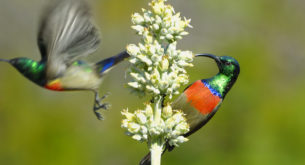A hazardous haze has blanketed Southeast Asia after forest fires in Indonesia turned the skies blood-red in the Jambi province over the weekend.
This is in the Middle of the day in Indonesia.
As smoke from Indonesia’s sprawling forest fires chokes neighboring Malaysia, authorities have distributed 2 million face masks.
185 people had been arrested for starting the fires.#Indonesia#wildfirespic.twitter.com/Ucd1hkwMdW— ~Marietta (@MariettaDaviz) September 22, 2019
The resultant reddish haze is known as ‘Rayleigh scattering’. Professor Koh Tieh Yong, of the Singapore University of Social Sciences, explained to BBC News that this occurs when certain types of particles are present in the air during a period of haze. Every year forest fires ignite in Indonesia, sometimes leaving a thick blanket of smoke over parts of Southeast Asia.
The fires come as a result of an illegal land-clearing method known as slash-and-burn. According to BBC News it is the easiest way for farmers to clear land and to get rid of any diseases affecting their crops.
The open burning method is used in Indonesia and some parts of Malaysia. Peak fire season is between July and October during the dry season. The national disaster agency of Indonesia reports that approximately 328,724 hectares of land have been burnt this year.
Big corporates and smaller scale farmers use the slash-and-burn method and take advantage of the dry season, clearing vegetation for palm oil, pulp and paper plantations. This same strategy is the cause of the Amazonian fires.
These bodies are partly to blame for this year’s haze, as fires have spun out of control and spread into protected forest areas.
According to BBC News, while this method is illegal, people have been allowed to continue to do it for years, due to corruption and poor governance.
Around 200 people have been arrested earlier this month in connection with starting the fires, reports CNN.
Indonesia’s National Police spokesman Dedi Prasetyo told CNN that suspects and perpetrators were arrested across the six provinces affected by the fires and four corporations are under investigation. He added that “99% of the forest and land fires occurred due to human factors”.
Indonesia has been and still is being ravaged by forest fires. This is not a filter. This is a #climatecrisis. Act like it! https://t.co/zziKKI8dI8 https://t.co/8Gj0hWgI6T
— Greenpeace (@Greenpeace) September 23, 2019
Toxic haze seriously affecting endangered orangutans and their habitat.
Massive forest fires in Indonesia have unleashed a choking haze across parts of southeast Asia https://t.co/8mzag6xhhD pic.twitter.com/3sWkkIyzyj
— AFP news agency (@AFP) September 19, 2019
Image: Unsplash



















